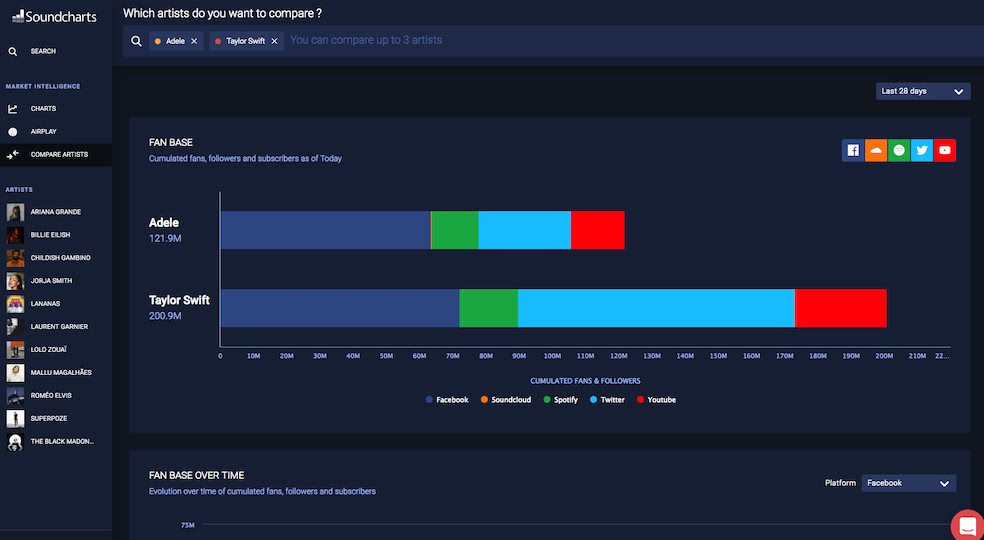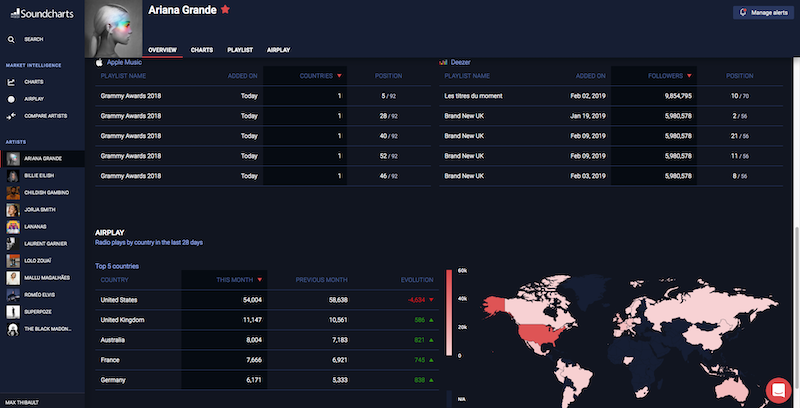Soundcharts Founder David Weiszfeld: ‘Major labels use us for two main reasons’

When music analytics platform Soundcharts launched its new service last month – complete with an overhaul of its pricing and data sets – David Weiszfeld, Founder & CEO of Soundcharts, detailed his philosophy on data sharing.
“The music industry is a network of interconnected teams working on separate artist’s careers,” he said at the time. “Record labels, agents, promoters and managers constantly need to share real-time information on artists and market trends. Our new philosophy puts the artists centre stage, allowing their teams to collaborate at no extra cost.”
Just over a week later (and three years since its inception), the service which brings together real-time and historical music consumption data from charts, airplay, playlists and social networks is a weapon for any industry sector’s arsenal.
The French company monitors 1,800 stations in 47 countries, tracks 2 million artists, and features real-time data from over 8,800 charts.
David Weiszfeld is headed to Australia next month for music conference FastForward Sydney, where he’ll show us the value of automated reporting.
In the below chat with TIO, Weiszfeld tells us the two big reasons leading music companies like the majors use Soundcharts, why it’s not a typical music company, and what he learned from the Techstars music incubator.
Tell us about the new platform. Why does the Australian music industry need to know about it?
As digital made the world smaller, we want everyone to have a real-time perspective on the world of music.
Back in the day, I didn’t want to be left in the dark on the activity of the artists I represented. I could not afford to subscribe to 10 local monitoring platforms, so, just like professionals in Australia, I had to ask people for the information or go through dozens of free, dysfunctional tools.
I’ve lost a lot of time doing that, and our time is the least scalable resource that we have.

David Weiszfeld
A day spent just to see what’s going on and write up a weekly report is the day when you’re not building careers. I think that applies to all music professionals, wherever they are.
The way our platform works paired up with its pricing make it a no-brainer for anyone who’s working with artists – as soon as they realise how much time can be saved by automating the data gathering and reporting process.
Your company won MidemLab and was identified in the class of 2018 Techstars music companies. Did those experiences open-up opportunities in the music industry?
Sure, they both did, in different ways. The MIDEM win was a bit earlier and it gave us a boost as it was the first big public recognition by the industry: we had clients before, but not much in terms of media attention.
The Techstars experience has taught me too many things to list here, but an overall understanding of how tech companies operate was #1. I was a music pro for 13 years before launching Soundcharts, and even if it is a company that deals with music data, it is NOT a typical music company.
The attention to detail that goes into building a tech product is not the same, compared to working with artists and marketers.
You’re working with the likes of Warner Music and Sony/ATV. Universal Music Group’s name is conspicuously absent from the marketing material. Is the company engaging with Universal? (You used to work with Universal, right?)
We don’t really talk about our clients except if they have been kind enough to allow us to use their names on our public website. What I can say is that we have clients coming from all three majors, either from their label or publishing departments.
Can you give some examples of how you’ve worked with one of the leading music companies noted on your website?
Large companies use us for two main reasons. First is scouting for talent, which is extremely hard in a world where 20k tracks are released every week. With Soundcharts, our users get a full understanding of an artist’s performance.
On top of that, our notifications and reports allow us to keep an eye on the growing songs and artists without having to manually go back to the platform to stay on top.

Soundcharts Overview
The other primary use case is artist development, and in that instance we act as the ultimate reporting tool (which is the #1 source of time loss at any music company).
The platform tells you what is going on in the world of social, charts, streaming playlists and radio. This allows people to actually focus on their job rather than spend hours building the reports that are, by definition, not up to date the minute they are sent to anyone.
We provide the Majors with sort of real-time marketing and promotional reports – mainly to track their campaigns, but also to monitor the competition.
What are your plans for Australia?
I’ll be attending FastForward Sydney in April! The conference is on the 11th and 12th and we’ll be in the country for a few days around the event to meet the industry people.

The Compare Artists tool enables users to benchmark artists with customisable graphs
What’s next for the company and its software?
We’ve just launched a revamped version of the platform that includes unlimited team members in every plan – we think that it is a game-changer for the industry.
We will keep shipping the new features in the course of the next few weeks (but we can’t announce them yet). Stay tuned!
This article originally appeared on The Industry Observer, which is now part of The Music Network.































